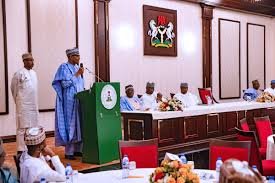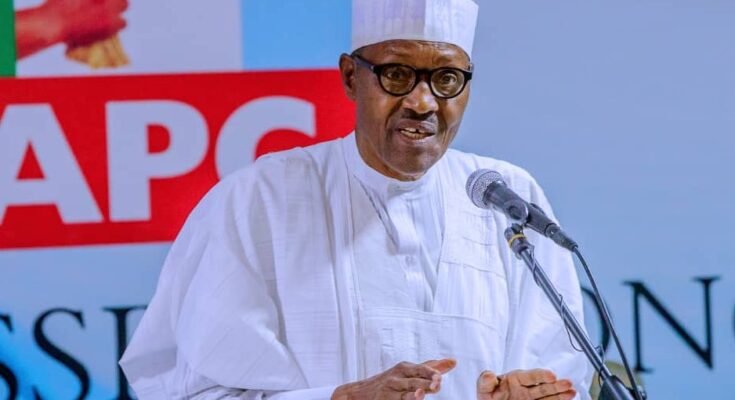At the turn of midnight on 31 December 2022, teenagers made bonfires with condemned tyers and combustible materials from the outgoing year. Like miniature comets, firecrackers blazed through the night sky, leaving trails of light. At dawn, their flares faded into the rising glow of our Sun, to reveal a breathtaking aerial spectacle.
It was more of a deafening farewell to 2022 than a warm welcome to 2023. In most states of Nigeria, however, there were subdued celebrations, as presidential elections were due to be held in February. It is the first dawn of the New Year. Everybody is excited and expectant. But Mazi Ojiofor is silent and visibly worried. He paces around his Obi (exclusive living room), lost in thoughts. He is waiting for the aligator pepper he had requested. His son had made a forbidden utterance after greeting him that morning; an abbreviation that has come to be synonymous with gloom and doom, especially in the past eight years. That three letter acronym is not only unworthy of an early morning drop, it also spells bad omen for the fortunes of the New Year. He decides to quickly perform a purifying ritual, to reverse the ominous effects of his son’s unguarded utterance.
In some African cultures, the aligator pepper is held in reverence for its cleansing efficacies. They are harvested as tiny peppery grains in a small wrinkled pod. Hot and spicy in a dry state, it is usually eaten with the kola nut. In Igbo mythology, it is believed that when served together, they constitute the sacred communion shared by humans and spirits as well as elders and ancestors.
Mazi Ojiofor steps forward into the courtyard, takes out a grain from the pod, sweeps his hand methodically around his head and body before discarding it. He repeats this procedure two more times. He then chews some grains of the hot spice and mutters incantations under his breath, as he endures the peppery sting. With a force of repulsion and repudiation, he spews the chaff into the air. Tufiaaaaaaaa! He gargles with a shot of dry gin and spews again. Tufiaaaaaakwa! He mutters more curses, turns to his son and orders him to repeat the whole procedure, for the appeasement to be complete.
Such was the scale of acridity and acrimony, with which most Nigerians held All Progressives Congress (APC) and its oppressive government.
Such was the depth of despair and despondency that most youths endured, for the eight long years of APC-led misgovernment.
After several failed attempts, General Mohammadu Buhari (retired) eventually rode to power in 2015, on a high horse of promises to eradicate ‘kwaraption’ and ‘inscruty’. In view of his antecedent as a former military Head of State, many Nigerians believed and trusted him. In hindsight, he would prove to be a disastrous error in judgement of character. His tenure as president would represent a blighted spot on the political landscape of Nigeria. The flaws and failings of Buhari’s government read like a taxonomy of misfortunes in a medieval tragedy admittedly, it is not possible to exhaust the labyrinth of Buhari’s malfeasance in this single commentary.
Under his watch, corruption festered like a diabetic sore, permeating all crevices of public service. For the first time in Nigeria animals learnt to steal currency. Snakes and monkeys were said to have swallowed or stolen unspeakable amounts of money. Sitting governors were caught in plain sight with indicting sums of foreign currency and trucks full of local currency. Recently, Judiciary has been used to block the EFCC from investigating one of them. Pension funds disappeared without trace. In Central Bank of Nigeria, billions of dollars developed wings and took flight. It is believed that ‘Naira’ was printed and dispatched at random without regards for regulations. In the last few weeks to the elections, they hatched an emergency currency swap to withdraw excess Naira from circulation. Ordinary citizens suffered the searing pain of this reckless exercise. And for all these wrongdoing, there were no consequences.
One major enemy of the Nigerian economy is the multiple exchange rates maintained by CBN throughout the Buhari era. It is believed that people from a particular region were specifically favoured with official dollar rates. They promptly round tripped same in the black market, making obscene profits in any currency of their choice.
Between 2015 and 2023, Nigeria’s external debt soared from $7 billion to $37 billion. There is little or nothing to show for this except economic strangulation. Buhari used Nigeria’s tax payers money to build a refinery in Niger Republic. He even borrowed from China on behalf of unborn generations, to build a railway line to that country. And the Transport Minister audaciously defended these projects on National television. What is more treasonous?

Under his direct supervision as Petroleum Minister, Buhari converted the NNPC to an ethnic teller machine. Humongous proceeds from oil sales disappeared from the books. Oil theft was at its peak. Pipelines were diverted to tankers waiting at sea.
In the dying days of his regime, he commissioned an unfinished refinery to pave way for the removal of fuel subsidy. More pain for the masses. More profits for the Oil Cabal.
The list is endless.
In the twilight of his administration, he oversaw the scamming of Nigerians with the ill-fated ‘Nigeria Air’ project by his townsman, the former Aviation Minister. The execution method of this particular fraud provided comic relief for brooding Nigerians.
Buhari came to power on a well-oiled propaganda machine that he would wage war against corruption. After two tenures of ‘kelptocracy’, corruption in Nigeria is not only alive and well, but has become metastatic and institutionalized.
Under his command, insecurity became the new normal. Internal terrorism, insurgency, banditary and kidnapping flourished like highly profitable enterprises. The war against Bokoharam became one of the greatest drain pipes of our economy in recent times.

Fulani herdsmen wielded military-type assault rifles and sacked entire villages. In eight years, Nigeria lost about 63,000 souls to violent and avoidable deaths in the hands of non-state actors. It was a heartbreaking harvest of blood and tears.
Our conniving president looked the other way and maintained sealed lips, while they killed and maimed in the most grisly manner. Nigerians often wondered if their president was actually a general or a genie.
Like a surrogate from an earlier age, robed in a garb of modernity, he came on a mission to supervise the destruction of Nigeria and inflict pain on her citizens.
Under his oversight, elections were marred by violence and INEC-induced irregularities, despite humongous funds spent on technology and logistics. His farewell gift was the worst electoral heist in living memory.
For Buhari, it was a relief to pass the baton, despite clear constitutional breaches, to cover his mess and evade probe in the aftermath.
For the youths who trooped out on election day, despite drenching rains and scorching Sun, it was a tearful surrender to the kidnap of hope, for a new Nigeria.
For senior citizens who must confront the uncertainties of pension payouts, it was a fearful contemplation of lack and misery in retirement.
For others across the generations, it was a direful daze of silence to the impunity of state-capture.
But for the ‘celebrants’, it was a successful ‘snatching’ of power after a brazen and brutal robbery at the polling units and collation centers.
The name of Mohammadu Buhari will continue to evoke chilling memories of that inglorious era. But he did not act alone.

Buhari’s presidency should be an eternal indictment on those that brought him to power; those who served his government at the highest levels; those who enabled him on that destructive trajectory and those who benefited from the anomalies and absurdities.
Like ‘workers’ in a beehive, his media minions buzzed around the villa; spewing all manner of lies to shield the disabilities of their principal; ever ready to sting and silence any voice of dissent with effortless propaganda. Today, they are all complicit in the tragedy of that outing. Like Goebbels of the Third Reich, history will remember them with contempt, as villains of a failed government.
By choice, Buhari allowed corruption, impunity and nepotism to define his presidency. Across board, his appointments were invidiously selective. He was so small-minded that he sacrificed competence and inclusivity on the altars of ethnic and regional hegemony. His brand of nepotism was petty, pathetic and very extreme. While the rest of the world dreamt big about the next industrial revolution, Buhari kept Nigeria at the pitiable level of ‘National Grazing Reserve Bill’. He flooded the civil service with his kinsmen, especially those who suffered incurable afflictions of graft, incompetence and crass arrogance.
For most of his presidency he was aloof and impervious to the wailings and ailings of Nigerians. He was affectless to the losses of life and property that became regular headlines. In times of national tragedy, President Buhari would, without notice, jet out of the country like a troubled man seeking the solace of a pub, to numb his misery. He was not only permanently disconnected from the travails of his citizens, he was also clueless with regards to solutions.
His forlorn facies radiated unforgivable ignorance.
His austere frame gave out a false impression of frugality.
His delicate poise communicated a deceptive demeanor of pseudo innocence. Like an assassin in a monk’s robe, he was able to feign helplessness in the face of murderous exploits of fellow herdsmen. Behind these impenetrable facades lay an extremely immoral mind.
At media encounters, he would wear a fixated mask of grotesque expression, to conceal his cluelessness and hide his brittle ego. His memory appeared to have frozen at the Civil War interlude in our tapestry of history. Ironically, he remembered more episodes of that ethnic genocide in greater detail, than he would recall fewer and more recent highlights of his colourless presidency.
He never pretended to conceal his denigration of the Igbo and their quest for self determination. No wonder that in one of his rare lucid moments, he scornfully described the South East (home of the Igbo), as a ‘Dot in a Circle’. Interestingly, Buhari is today best described as a ‘Circle in a Dot’, on account of the huge debts he incurred and the lilliputian achievements he left behind. By an uncanny twist of fate he has become a victim of his own metaphor.
Nigerians are known for their magnanimity in forgiveness and forgetfulness. But history neither forgives nor forgets.
It would be an undeserved luxury to consign Buhari and his cohort to the dustbin of history, as many writers have suggested.
On the contrary, history should guarantee that his name is permanently tainted, with the blood of innocent victims of herdsmen massacres. History and literature should further ensure that Buhari, his handlers and enablers are elaborately documented for the benefit of posterity; their ignominious legacies preserved in tatters, forever.
We have barely survived the ‘season of the locusts’. While we are still sobbing from the battery of the last regime, another president from the same camp just got inaugurated, promising to continue the ‘good work’ of his predecessor. Bewildered Nigerians are fervently praying and feverishly hoping that ‘Affliction shall not arise for the second time’. (Nahum, 1:9)
![]()



